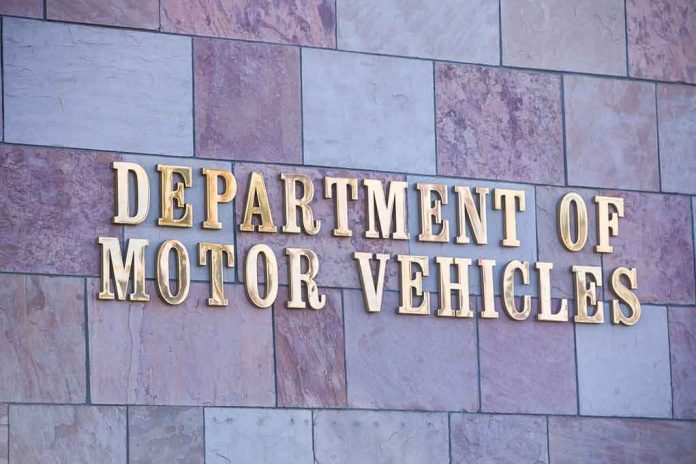
The Texas DMV faces a firestorm after reports revealed illegal aliens have been registering vehicles, prompting calls for urgent action to restore law and order on Texas roads.
Story Snapshot
- Rep. Brian Harrison formally complained that illegal aliens are registering vehicles in Texas, exposing a critical security loophole.
- The Texas DMV’s verification process is under scrutiny, and lawmakers threaten legislative action to close the loophole.
- Heightened debates over state versus federal roles in immigration enforcement reignite following the complaint.
- No public response from the DMV as of November 4, 2025, leaving legal Texas drivers demanding answers and accountability.
Texas Lawmaker Demands Answers on Vehicle Registrations
Texas State Representative Brian Harrison, a strong advocate for secure borders and public safety, sent a formal complaint on November 3, 2025, to the Texas Department of Motor Vehicles. Harrison’s office had verified reports that individuals without legal immigration status successfully registered vehicles in Texas, raising alarms about the DMV’s procedures. The lawmaker’s letter demands an immediate investigation and policy clarification, threatening new legislation if the agency fails to act. This development has put the DMV under intense legislative and public scrutiny.
This incident occurs as Texas continues to grapple with the consequences of lax enforcement inherited from previous administrations. Historically, vehicle registration in Texas required proof of identity, but not always proof of legal immigration status unless specifically mandated. Recent incidents involving unlicensed or undocumented drivers in accidents have already stoked public concerns. The July 2025 implementation of HB 718, which banned temporary paper plates to combat fraud, underscores the ongoing struggle to secure Texas roads and prevent abuse of government processes.
Broader Implications for Immigration and Public Safety
The controversy highlights Texas’s central role in the national immigration debate. With federal authorities increasingly requesting state data to verify citizenship status, the spotlight is now on how state agencies, like the DMV, handle their responsibilities. Law enforcement officials voice concerns about the risk posed by unverified registrations, especially given previous cases of registration fraud and the use of fraudulent plates. The ongoing tension between providing services and enforcing the law is fueling demands for stricter policies and improved accountability at the state level.
Undocumented immigrants, who benefit from the current registration process, could soon face new barriers if legislative changes require proof of legal status. Law-abiding Texans, meanwhile, see this as a necessary step to enhance road safety and curb fraud. The DMV, caught in the middle, may be forced to overhaul its compliance procedures, potentially increasing administrative burdens but answering long-standing calls for reform from both lawmakers and the public.
Threat of Legislative Action and Political Fallout
Harrison’s complaint is not just a call for an internal review—it signals the likelihood of major legislative changes. If the DMV does not address the alleged loophole, the state legislature is poised to require legal status verification for all vehicle registrations. This would align Texas policy with the Trump administration’s broader priorities of restoring order and safeguarding American communities, as Texas has become a flashpoint in the national conversation on illegal immigration and state sovereignty.
The political fallout could extend beyond Texas, as similar complaints may arise in other states facing pressure from conservative lawmakers and constituents demanding action. For Texans, the episode serves as a reminder that vigilance is required to protect the integrity of state institutions, defend the rule of law, and ensure that government services do not reward those who flout immigration laws.
Expert and Community Perspectives
Law enforcement and DMV officials have historically cited fraud as a major concern, which led to reforms like the ban on paper plates. Immigration policy experts warn that verification systems must balance accuracy with fairness, as overbroad checks can result in mistaken denials for eligible residents. Civil liberties advocates caution against the risk of discrimination or wrongful denial of services, but supporters of stricter enforcement argue that only robust verification will prevent abuse and protect the public.
At present, the core claim remains based on a legislator’s verified complaint, as the Texas DMV has yet to issue a public response. Law-abiding citizens and conservative leaders across the state await decisive action, determined to see the rule of law upheld and the security of their communities restored.
Sources:
Texas DMV has allegedly been registering vehicles to illegal aliens
DHS wants Texas’ driver’s license data to check citizenship. The state is resisting.
ICE Nabs Over 120 Illegal Immigrant Drivers After Probe Exposes Major Loophole Found In Texas DMV
Texas Paper Plates Going Away: New Law HB 718 Goes Into Effect July 1 to Combat Crime





